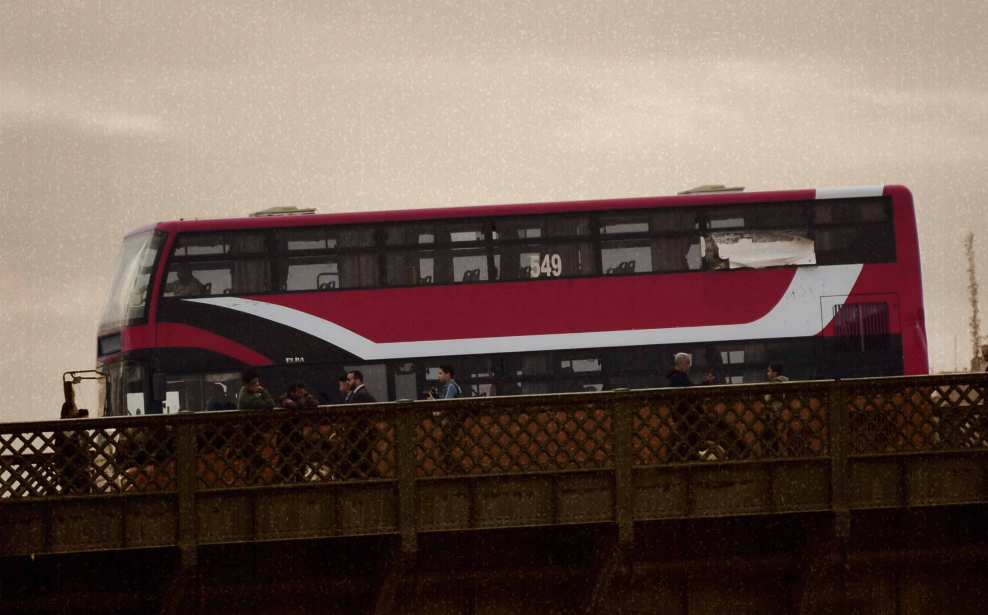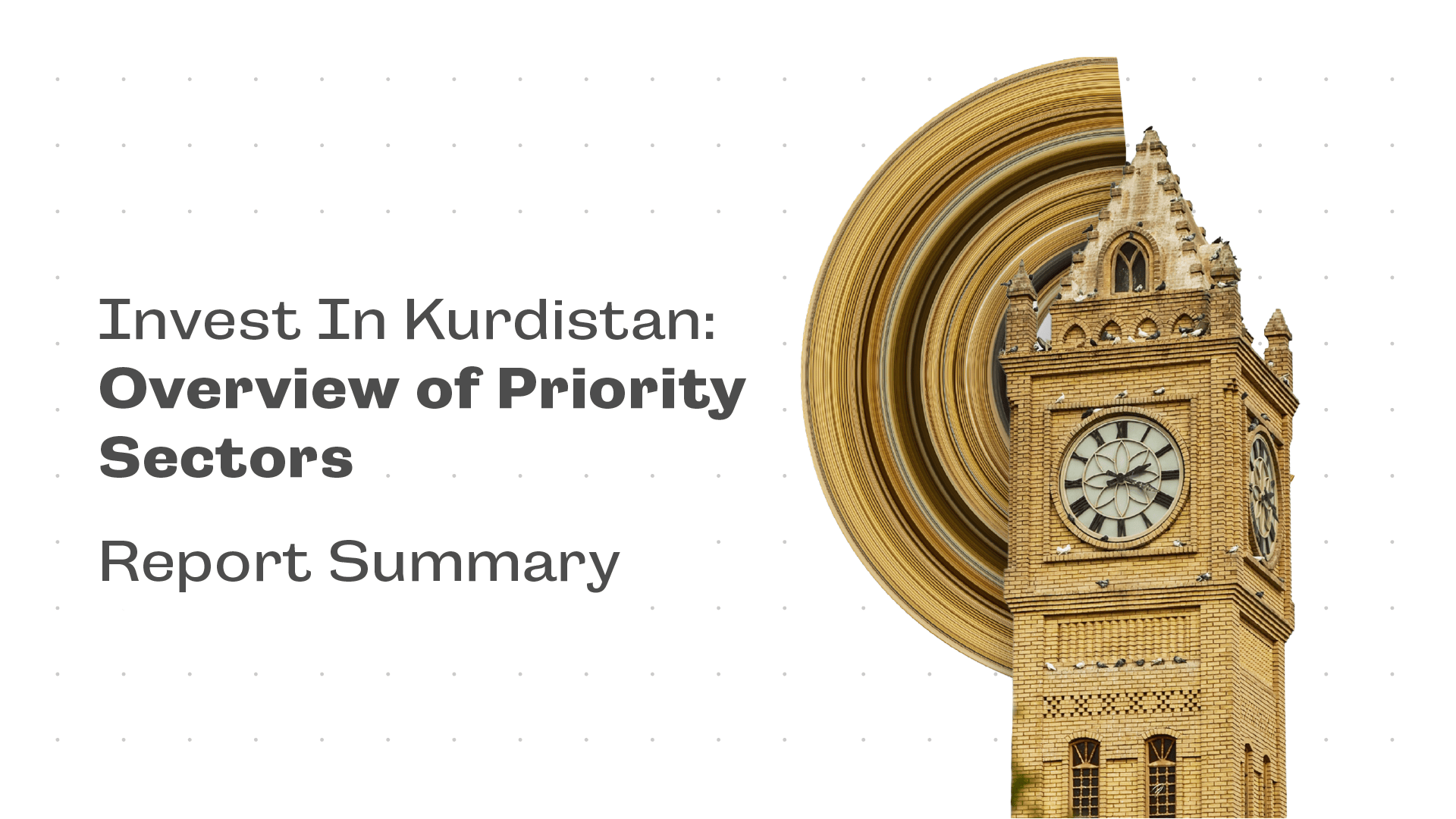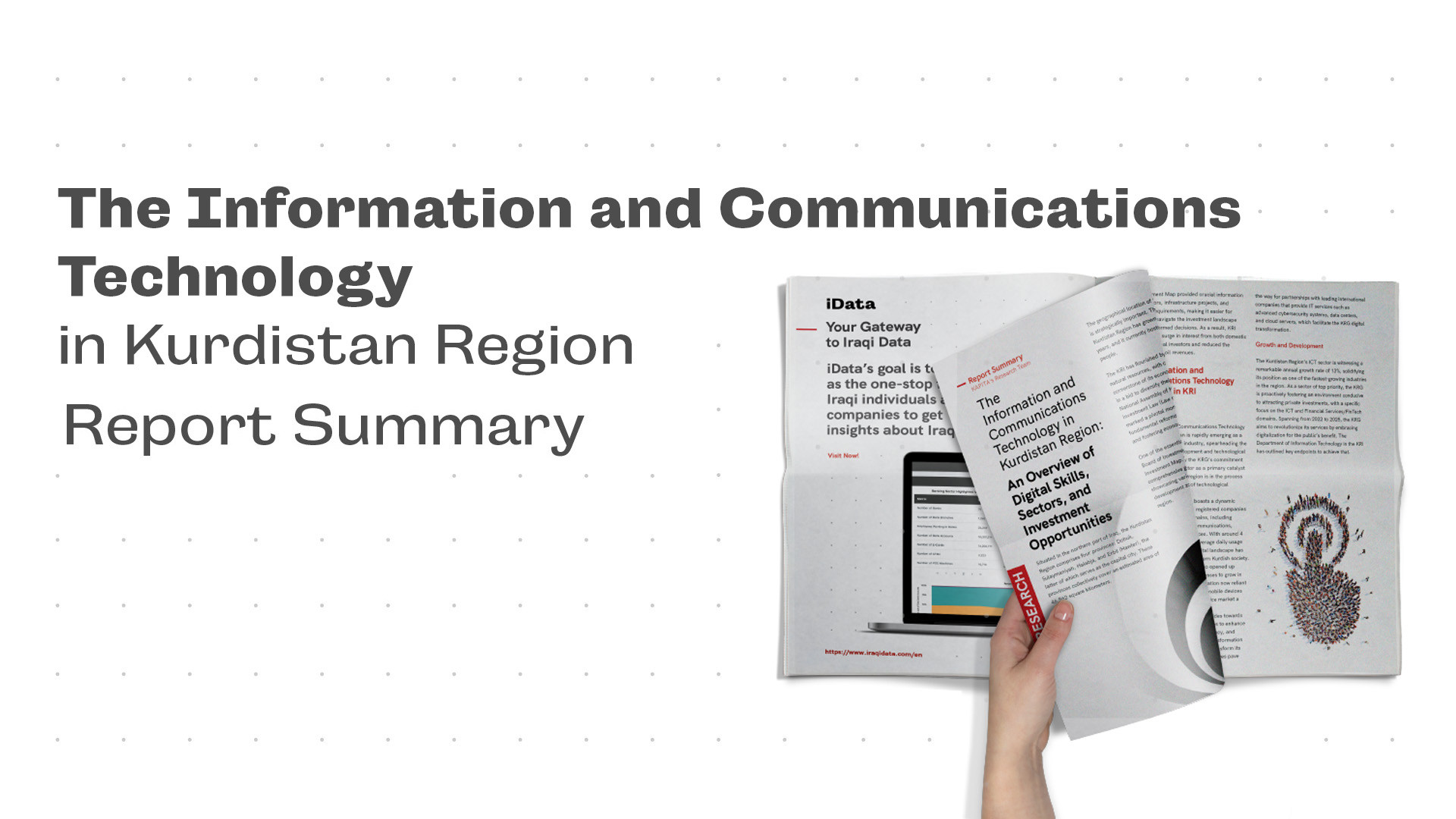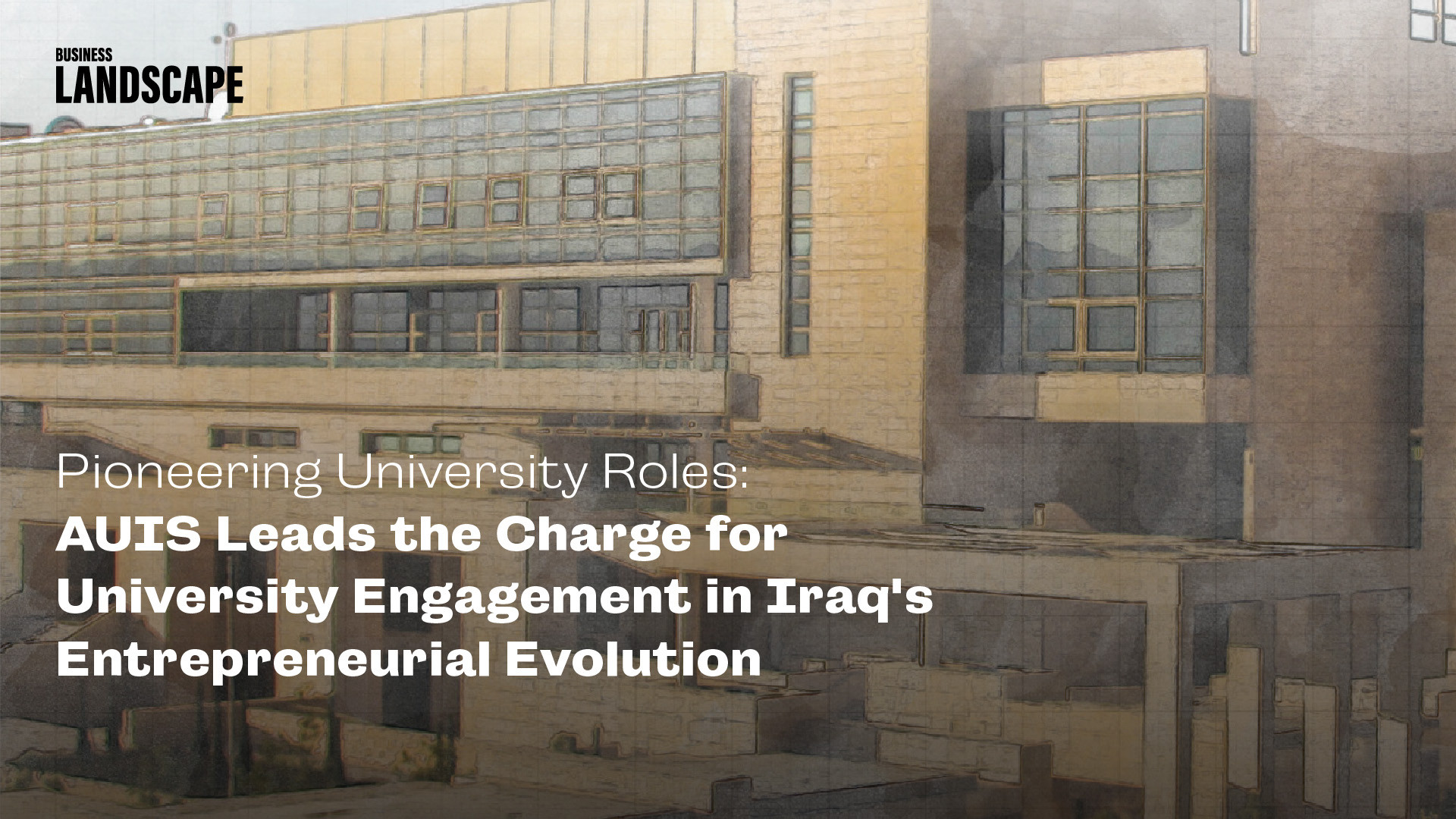KAPITA’s Research Department
Report Summary
A brief history of transportation in Iraq takes us back to the 1920s. Similar to many countries in the region, Iraq’s means of transport were orthodox and basic, residents mainly depended on horse-drawn carriages and boats. For international travel and fishing, ships were deployed off the coast of Al-Basra. The modernization of transportion was introduced to Iraq in the 1950s by adopting modern machinery. Paved roads began to emerge, and private automobiles and public transportation were becoming the new norm in urban areas.The Tigris and the Euphrates, Iraq’s principal two rivers, were utilized by steamboats, a step that greatly enhanced commodity transport operations.
The major breakthrough in the transportation sector came in the 1970s, when a significant portion of Iraq’s domestic development budget was allocated to boost aviation and maritime modes of transport, fostering regional networks to facilitate industrial expansion. Additionally, air jets and modern ships were deployed to connect Iraq globally, securing its position as an international economic trade hub.
A decade later, Iraq is involved in a consecutive chain of conflicts and wars that left its infrastructure substantially damaged for years to come. This, in turn, hindered the nation from keeping up with the technical growth the world was experiencing.
Roads
Roads affect the entire economy, directly and indirectly influencing people’s lives, which is why since 4000 BC, Sumerian constructed stone-paved streets in Ur. Modern-day Iraq has a generally relatively developed road network, with proper coverage of most cities and rural areas. However, the subsequent abuse, extensive damage, lack of maintenance, and successive over-reliance on the road network for transport, mainly due to the weak railway system, has added pressure on the outdated road network.
There is a state run public transportation system serving the citizens, the actual terminal facilities are owned and managed by the MoT. Road transport in Iraq is managed by the Ministry of Transport through the State Company for Travellers and Delegates Transportation and the State Company for Land Transport.
In 2015, there were 110,345 km of paved roads, more than double what existed in 2010 (41,716 km). Iraq has two main highway roads, the older one, Iraq Expressway 1 connects the Iraqi-Jordanian border to Basra, it is 1,200 km in length, and Iraq Expressway 2, which connects the Iraqi-Turkish borders to Baghdad where it is joined with Iraq Expressway 1. The following map shows the length of roads in each governorate in Iraq (Except for the KRI region).
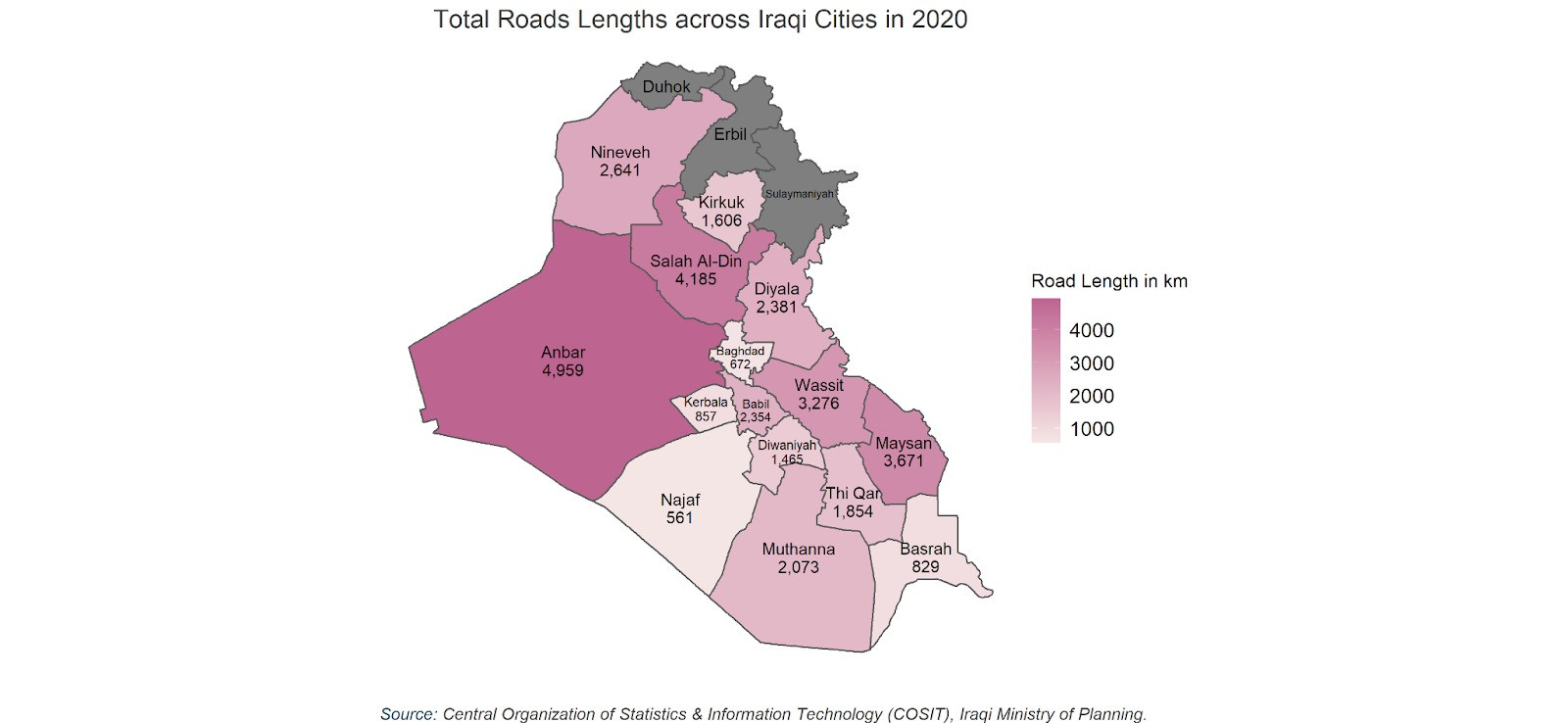
Due to the lack of proper public transportation system, there is an incline in the number of cars with plate numbers in Iraq, an addition of almost one million cars between the years 2016 and 2020, from 6.1 million cars in 2016 to 7 million cars in 2020. From the total number of cars all over Iraq in the year 2020, 35% (2,479,898 cars) of them are located in Baghdad, which is only natural due to its 8.3 million inhabitants. Second and third to Baghdad come the KRI governorates, Erbil and Sulaymaniyah, with 772,022 and 569,252 cars, respectively.
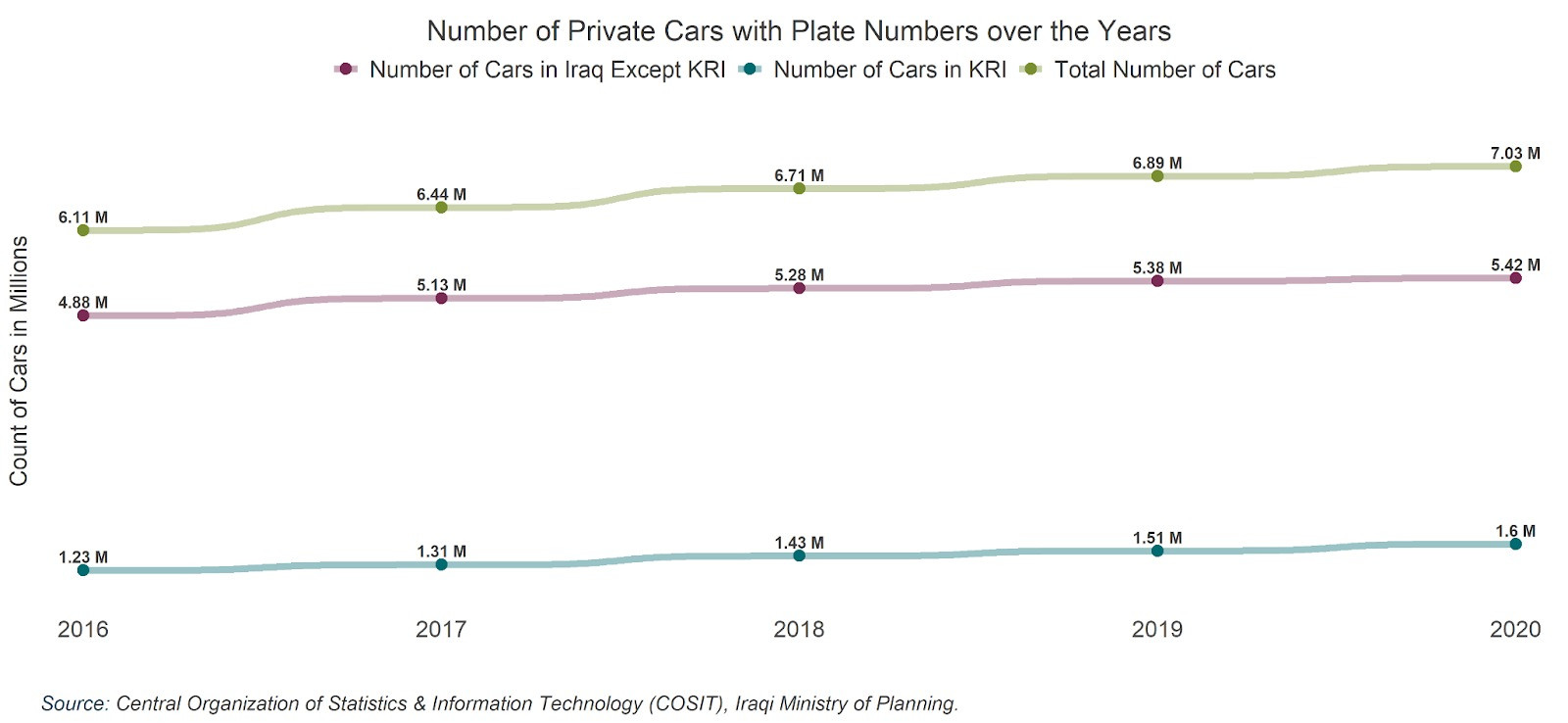
Congestion is a grave problem for Iraqis, the many roadblocks (permanent and temporary) installed for security reasons, the over-reliance on private transportation, and the diversity in transportation vehicles due to the absence of strict regulations and their implementation are a few of the reasons. The graph shows the time it takes for a person to travel from 2 locations in Baghdad when the roads are clear and during rush hours, the difference is around more than double the time.
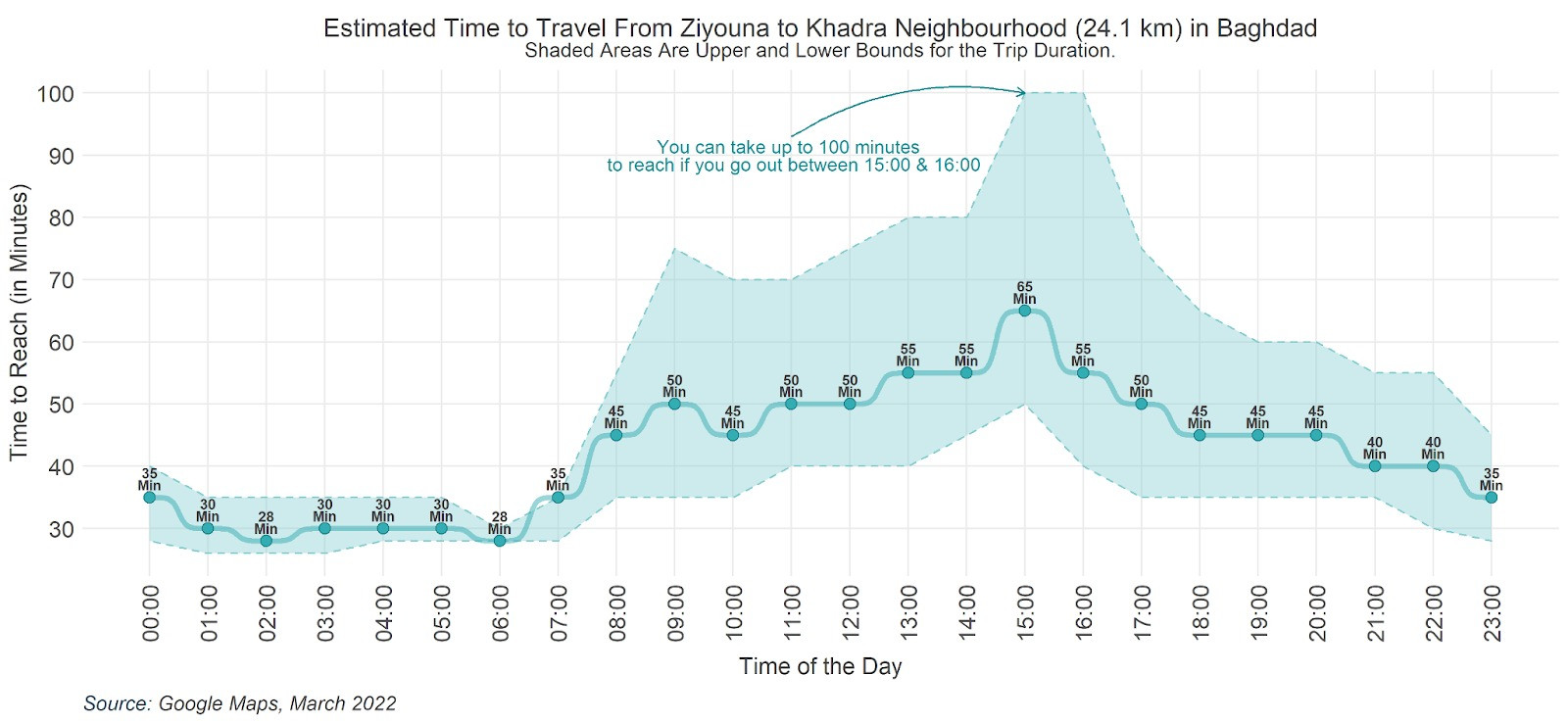
Transportation has been a starting ground for many tremendously successful startups and businesses, services include, but are not limited to, taxi services, vehicle rentals, trucking, as well as special transportation of livestock, medical equipment, and machines. Iraqi roads have been hospitable to many transportation-related startups and companies, local and international, and they are as follows:
Ride-Hailing Businesses could be argued as the most impactful disruptors in the urban transportation sector in the past decade, where a person could customize their ride order to a destination of their choosing, even picking from a variety of vehicle and ride options.
Obr: A company that is registered in the United Kingdom and approved by the National Investment Commission and the Iraqi Ministry of Transport. Currently operating in Najaf, Baghdad, Erbil, Babil, Karbala, and Fallujah.
Taxi Al-Mumayaz: Is a new service that was launched in October 2020, and works in collaboration with the Civil Aviation Authority. The project has specialist personnel and contemporary VIP automobiles to transport people to and from Baghdad International Airport.
Careem: is a super app that operates in over 100 cities across 14 nations, overtaken by Uber in 2020. In Iraq, Careem launched its ride-hailing services in 2018, recently adding delivery to transport packages. It operates in Baghdad, Erbil, Najaf, and Basra, along with upgrading its services to provide deliveries in Baghdad, and cross-city rides.
Baly: Launched in 2021 and supported by the German company Rocket Internet. Baly provides ride-hailing and meal delivery services. It aims to uphold the standards of affordability, convenience, and safety, giving the option of different types of ride services to choose from and different modes of payment.
Lady Go: Is an Iraqi startup that was established in 2019, with the goal of imposing a cultural and social impact by empowering women through their venture. By adopting the model of women-only drivers, Lady Go offers ride-hailing services to women and children only, aiming to provide a comfortable transportation experience.
Last-Mile Delivery services address the final step of shopping, where the package finally arrives at the buyer’s door. They are key to customer satisfaction and can be the most expensive and time-consuming step in the purchasing journey.
Talabatey: is the largest meal delivery service in Iraq, with more than 5 million downloads. The application was launched in 2016 as a food ordering app, and has since covered all of the Iraqi governorates and expanded to Syria and Sudan, with plans to expand to Kenya soon.
Al-Saree3 and AlZajel: is a food delivery company that was established in 2018. They currently have more than 1 million downloads in Baghdad only and successfully delivered more than 5 million items in the last few years. AlZajel was launched in 2019 as the first of its kind service to provide an on-demand delivery service within one hour to any area in Baghdad.
Lezzoo: A last-mile delivery service with plans to expand to a super app, that was founded in Erbil and launched in 2017 and has since expanded to the Kurdistan region.
Toters: is an on-demand delivery tech platform established in 2017 in Lebanon and launched in Baghdad at the beginning of 2019, with Basra and Najaf recently entering their list of covered governorates.
Talabat: a Kuwaiti startup company that was founded in 2004 that specializes in online food ordering. It operates in many MENA countries, and it entered Iraq through Erbil and has since expanded to Baghdad, which was added in January, 2022.
Hi-Express: Founded in 2018, with a focus on the B2B segment, serving more than 170 vendors over the past year. Their application offers registration of businesses, order of delivery pickup, and tracking of package delivery status.
Sandoog: They started their delivery service in April 2018 to address a gap in the Iraqi logistics market related to the broken delivery and logistics value chain, delivering half a million orders and handling over $10M in cash for their merchants. They have offices in Baghdad, Erbil, and London.
Many other companies and startups not mentioned above are operating in Iraq, more details are available in the report.
There are many issues and planned projects to address them regarding road transportation. Some of the major issues involve road security, maintenance and development of the road network, shortage of the investment in the cargo transportation, lack of development and regulations, and outdated google maps service.
Many planned projects involve the restoration of the mailing system, the establishment of bridges for cargo transportation across the country, as well as the rehabilitation and construction of various highways.
Railways
In 1869, Iraq had a tramway in the Kadhimiya area, used for people and cargo transportation. By 1953, the Iraqi Republic Railways (IRR) was established and operations commenced directly under the supervision and authority of the Ministry of Transport. Currently, there is only one international interchange, and that is at the Syrian borders at Rabiya. The railways are used to transport goods from mines, ports, and industrial zones covering most of the country.
In the graph, we notice the four most important railway lines, three of which start from Baghdad, and connect to large cities like Basra and Mosul. The shortest one links Kirkuk-Beygee-Haditha, and is mostly used for produce and oil transportation.
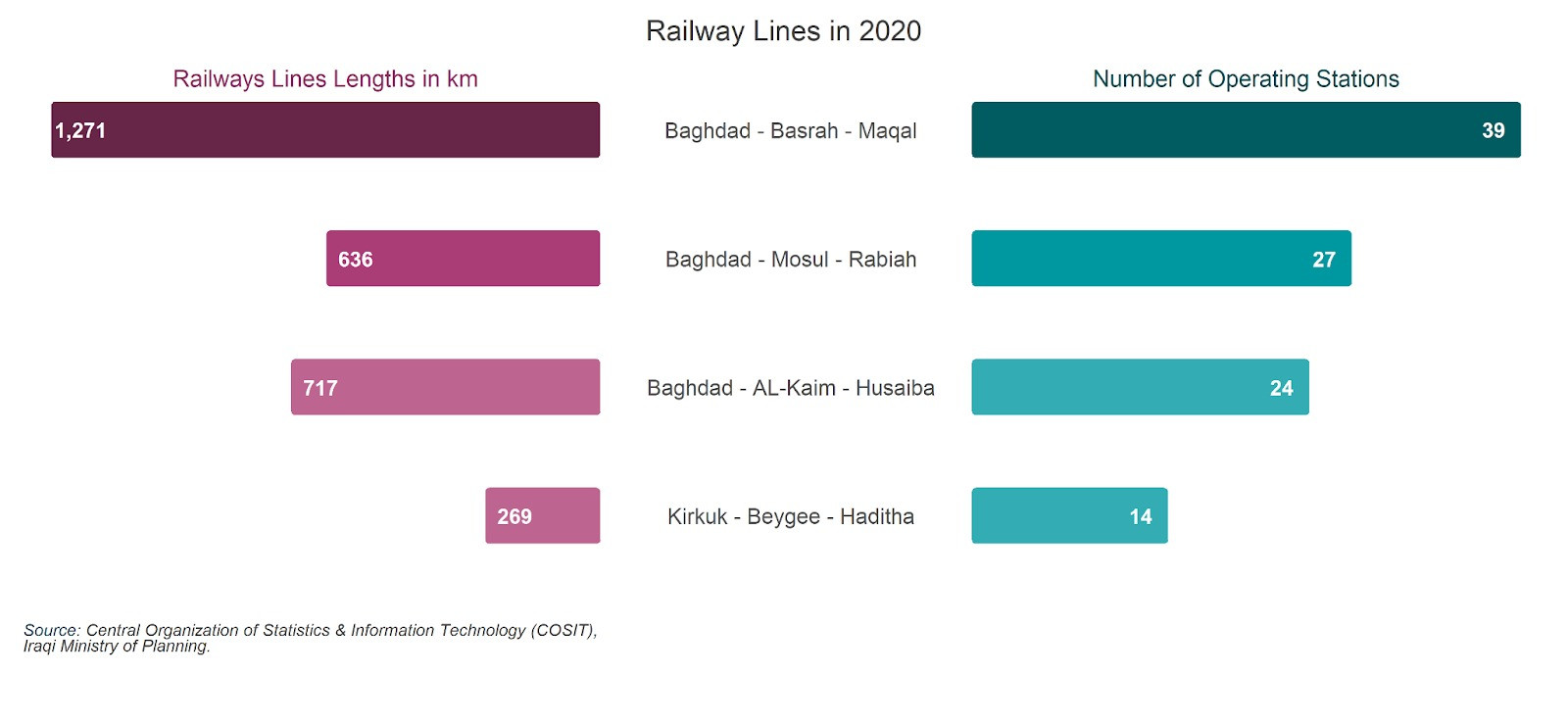
The railways have seen an increased turnout by passengers in 2018, reaching more than half a million passengers, an improvement of around 21% from the year 2017. Cargo transportation has improved greatly during 2020, coinciding with the COVID-19 pandemic, totaling 1,293 thousand tons, that is 2.4 times the volume transported in 2019.
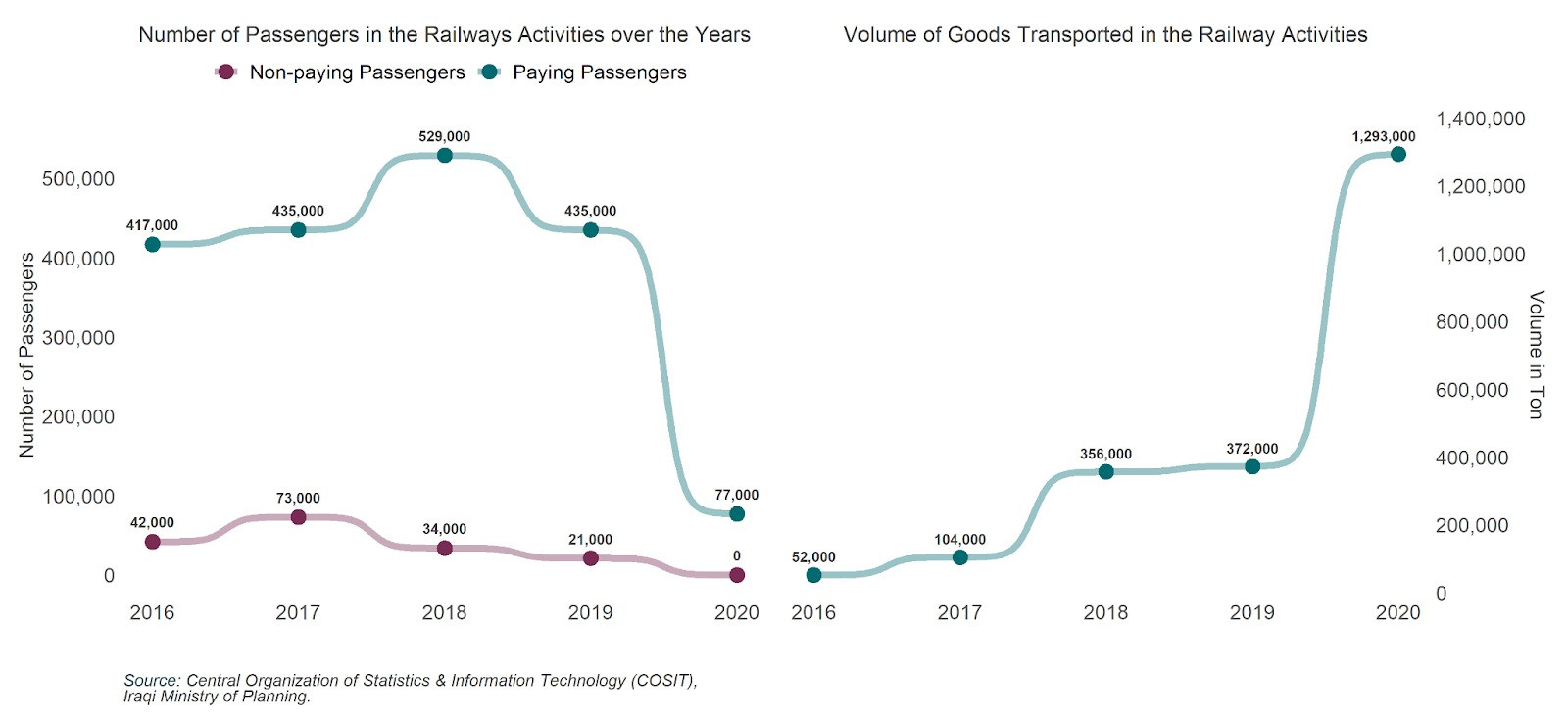
The increase of passenger and cargo numbers, surprisingly has not translated well in terms of revenues. As we can see in the graph, although the volume of cargo has increased incrementally in 2020, the revenues in 2020 are less than that of 2019. Regarding passenger transportation, the 21% increase in the number of paying passengers in 2018 has not increased the passenger transport revenue in 2018.
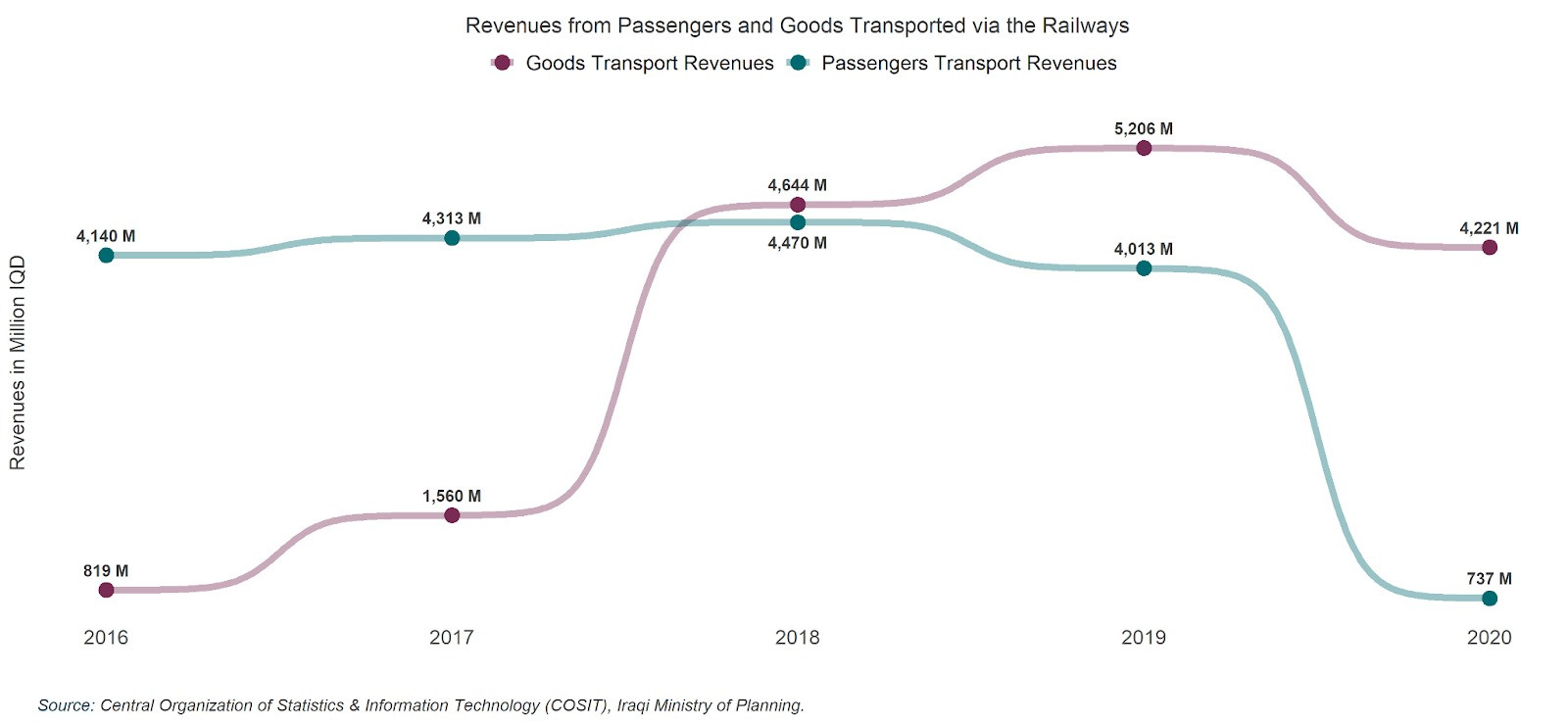
Many plans are laid out for the expansion of the Iraqi Republic Railways, including 3 railways at border points, the first connecting Iraq to Turkey, the second connecting Iraq to Iran via the Shalamcheh border, and the last connecting Iraq to Jordan via the Rutba-Trebil border. In the Iraqi investment plans of 2018 and 2020, many plans for railways expansion were noted, including the Baghdad loop line railway project, the Basra-Faw railway line, a MonoRail in Karbala governorate, and the Basra Metro, to name a few.
